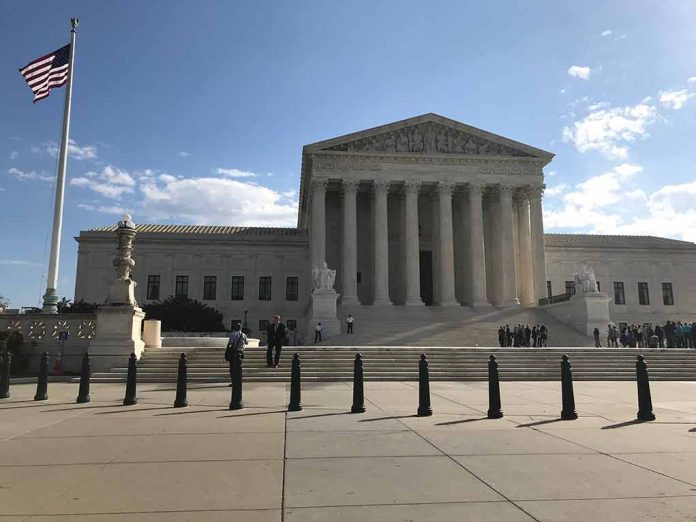
Spokane’s Homeless Headache: ACLU Takes on City Ordinances
Well, well, well… looks like the liberal utopia of Spokane, Washington, is getting a taste of its own progressive medicine. Just when they thought they had the green light to clean up their streets, along comes the ACLU to throw a wrench in the works. Buckle up, patriots, because this legal battle is about to show us just how far the left will go to prioritize tent cities over tax paying citizens.
The Spokane Showdown: ACLU vs. City Ordinances
In a move that’s sure to ruffle some feathers, the ACLU has filed a lawsuit against Spokane, Washington, challenging the city’s anti-camping laws. This legal action comes hot on the heels of the U.S. Supreme Court’s June ruling, which gave cities the green light to enforce outdoor sleeping bans. The ACLU, ever the champion of the downtrodden, argues that Spokane’s ordinances are unconstitutional under state law, despite the federal ruling.
Blue City Hit With Lawsuit Over Homelessness Laws Following Landmark Supreme Court Decision https://t.co/7brnvozijo
— IJR (@TheIJR) August 1, 2024
The Constitutional Conundrum
At the heart of this legal battle is a fascinating constitutional twist. While the Supreme Court found that such bans don’t violate the Eighth Amendment’s prohibition on cruel and unusual punishment, Washington state’s constitution offers more protection. It prohibits “cruel” punishment, period. No need for the “unusual” part.
“This Spokane case serves as another opportunity for us to build out those protections under our state constitution, which is more protective than its federal counterpart,” says Jazmyn Clark, an ACLU attorney.
This legal nuance could set a precedent for other states with similar constitutional language, including Pennsylvania, Delaware, Rhode Island, Kentucky, and South Dakota.
The Stakes for Spokane
Spokane’s ordinances on camping, sitting, or lying on public property aren’t just gentle suggestions – they’re misdemeanor crimes punishable by fines or jail time. The ACLU argues that these laws effectively criminalize homelessness, creating “near-total islands of exclusion throughout the city.”
With Washington boasting the fourth largest homeless population in the U.S. – over 28,000 as of 2023 – the outcome of this case could have far-reaching implications for cities grappling with homelessness across the state and potentially the nation.
The Ripple Effect
The Supreme Court’s decision has already emboldened other cities and states to adopt stricter encampment policies. California and San Francisco, for instance, have taken steps to clear their streets. But with the ACLU’s challenge in Spokane, the tide could turn once again.
As we await the court’s decision, one thing is clear: the battle over how to address homelessness in our cities is far from over. Stay tuned, patriots, because this Spokane showdown could reshape the landscape of urban policy for years to come.
Sources
- Blue City Hit With Lawsuit Over Homelessness Laws Following Landmark Supreme Court Decision
- ACLU sues Washington state city over its anti-homeless laws after a landmark Supreme Court ruling
- Blue City Hit With Lawsuit Over Homelessness Laws Following Landmark Supreme Court Decision
- ACLU sues Washington state city over its anti-homeless laws after a landmark Supreme Court ruling
- ACLU sues Washington state city over its anti-homeless laws after a landmark Supreme Court ruling
More from Around the Web
Reichert says Washington should follow California governor’s lead on homeless order
Lawsuit against City of Spokane on homelessness points to several city ordinances
ACLU sues Washington state city over its anti-homeless laws after a landmark Supreme Court ruling;
ACLU sues Washington state city over its anti-homeless laws after a landmark Supreme Court ruling https://t.co/rgRLogk6qe
— The Associated Press (@AP) August 2, 2024
Blue City Hit With Lawsuit Over Homelessness Laws Following Landmark Supreme Court Decision;
Blue City Hit With Lawsuit Over Homelessness Laws Following Landmark Supreme Court Decision https://t.co/7brnvozijo
— IJR (@TheIJR) August 1, 2024
BREAKING: The Supreme Court ruled today that cities can punish unhoused people for sleeping in public, even if they have nowhere else to go.;
BREAKING: The Supreme Court ruled today that cities can punish unhoused people for sleeping in public, even if they have nowhere else to go.
We cannot arrest our way out of homelessness.
— ACLU (@ACLU) June 28, 2024
The Supreme Court has taken up a case on homelessness that may have broad implications as record numbers of Americans lack permanent housing. I break it down on today’s episode of The Excerpt.;
The Supreme Court has taken up a case on homelessness that may have broad implications as record numbers of Americans lack permanent housing. I break it down on today's episode of The Excerpt.https://t.co/98spO9jwNO
— Maureen Groppe (@mgroppe) April 23, 2024









